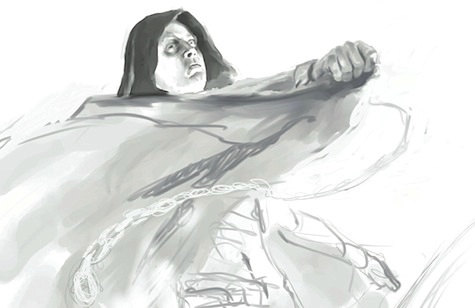A special five story preview of Shawn Speakman’s epic fantasy anthology Unfettered will be released at Phoenix Comicon this Memorial Day weekend. This week, we’re taking a spoiler-free look at all five stories, many featuring new glimpses of our favorite fantasy worlds.
I read Terry Brooks’s Shannara trilogy when I was pretty young, and if I’m being honest, I don’t remember them all that well. But I do remember how much I enjoyed reading them. I remember liking Allanon best and imagining that he would appear at my house one day and tell me that I was descended from a magical line of elves. I remember being inspired by the idea that a magical world could be our distant future, rather than a mythic past, and using colored beads as my elfstones.
I wish I had gotten my hands on Terry Brooks’ short story “Imaginary Friends” back then, too, because I would have adored it.
In the introduction to “Imaginary Friends,” Brooks talks about how the story was originally written for an anthology of modern fairytales in 1990. At the time he was interested in writing a new fantasy epic set in the modern world, (this was before the World and Void series) and he claims he used “Imaginary Friends” as a template and trial space for the kind of magic that he thought could plausibly exist within the world we know.
The protagonist of the story is 12 year old Jack McCall, who, upon learning that he has leukemia, finds himself caught up in the memory of an adventure he’d once had in the mysterious park behind his house. Although his mother and father have convinced him that the elf, named Pick, that he had met there was just an imaginary friend, Jack is convinced that he needs to find his way back to the elf and the magical park filled with trolls and ghosts and the imprisoned but still dangerous dragon, Desperado. But that adventure was long ago and maybe not even real, and what does Desperado have to do with Jack’s sickness, anyway?
Perhaps my favorite part of the story is the parallel between the “imaginary friend” Pick and the real best friend, Waddy Wadsworth. When Jack tells Waddy about his cancer, Waddy is unphased, pointing out that Jack’s condition might not be terminal, and that “people get well all the time just because they believe they can do it. Sometimes believing is all it takes.” And sometimes, Pick argues, people can defeat dragons just by having the determination to do it.
Both traditional fairy tales and many modern children’s stories are designed to teach lessons to children, lessons about greed, or not trusting strangers, or how to face the trials of growing up. They can also provide tools to help children face those trials, and that is clearly what Brooks designed “Imaginary Friends” to do. When I was younger, I was sometimes accused of being escapist, of existing too much in an imaginary world and not enough in our real one, but I found a lot of strength in the fantastic worlds of my books and TV screen. When I was timid about making new friends at school, I remembered Tamora Pearce’s Alanna, and when I got tired and bored on a hiking trip with my parents, I imagined I was Frodo carrying the One Ring to Mordor. Scared of failing a midterm? James T. Kirk wasn’t when he was a cadet at Starfleet Academy. These may be somewhat trivial examples, but stories can come to a child’s aid in times of fear and conflict, just as Pick and the magic park come to Jack’s.
No one dies in seventh grade, or so Waddy tells Jack, and Jack tries to use this thought to comfort himself, but the truth of mortality is something he has never had to face before. What he could really use is a shield and a sword to wield against his enemy. Perhaps a trashcan lid and a walking stick and an elf named Pick can oblige.
Check back with Tor.com tomorrow for a look at Kevin Hearne’s “The Chapel Perilous” and how Arthurian tales can be a versatile core for any fantasy story. More about Unfettered.
Kelsey Jefferson Barrett is an author and a grad student at Drew University. You can currently find their fiction in Lightspeed Magazine (under Kelsey Ann Barrett).










